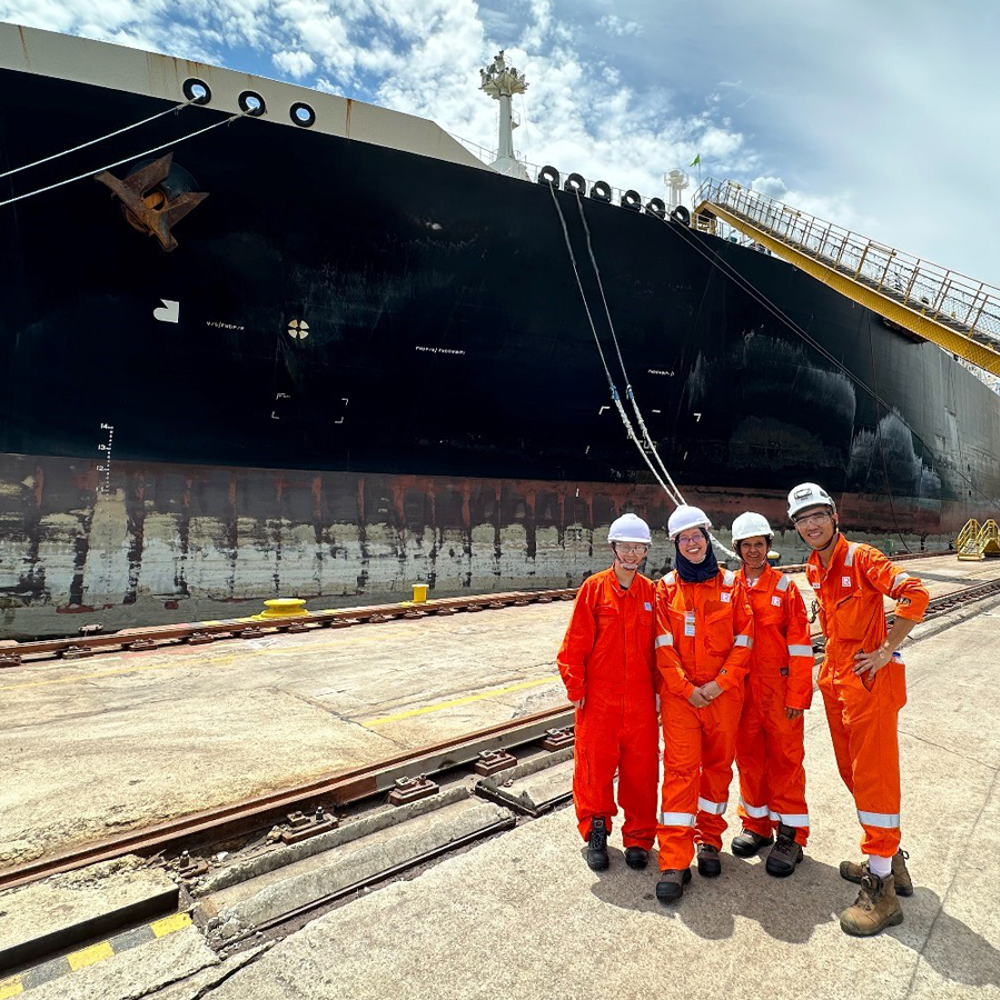Ethan Tan’s entry into the maritime sector was not a predetermined path but rather a series of insightful discoveries. With a degree in mechanical engineering specialising in offshore, he began his career as an assistant ship repair manager and it was in this role that he first worked alongside marine surveyors.
Impressed by their high levels of technical proficiency and deep problem-solving skills, he realised the crucial role class plays in ensuring ship safety. “That intrigued me and I knew I wanted to be part of that process,” he says. “I realised that surveyors’ roles went beyond just overseeing repairs; they ensured technical compliance and upheld safety regulations.”
So he set his sights on becoming a surveyor and was quickly recruited by a classification society, where he honed his skills to become a senior surveyor. He joined LR in 2022. Over the past 15 years, Tan has developed deep expertise in passenger ship and LNG vessel repairs, two of the most complex vessel types to arrive at Singaporean yards for repair.
Tan’s interest in passenger ship projects stems from their fast turnaround times. No operator wants their ship to be in the yard for any longer than is necessary, as every hour away from being in service is lost revenue. It’s a sentiment that is especially pronounced in the cruise sector, as the size and complexity of the vessels can lead to longer periods in the yard. “The fast pace and meticulous planning required especially for cruise ships always fill me with adrenaline,” he says.
He refers to one project that required the retrofitting of four exhaust gas scrubbers on one cruise ship. “The installation required seamless coordination between the shipowner, yard teams and LR surveyors,” Tan noted. “Seeing the vessel sail off successfully after four intense weeks of work brough a real sense of achievement.”
This type of focussed work is one of many reasons Tan enjoys his job. “Surveying is a very good career in my opinion,” he enthuses. “You must train yourself to make sound decisions in limited amounts of time,” he says pointing out that with evolving regulations coming to play, the next generation of surveyors will need these skills more than ever before.
It’s a tough job, but there is nearly always a good solution to a problem that everyone is happy with. In that sense it is extremely rewarding and I enjoy doing it.
Compliance and efficiency
Surveying is not without its challenges, particularly when it comes to enforcing regulations with shipowners eager to minimise downtime. “Acknowledging clients’ concerns and finding a solution that meets regulatory requirements is key,” says Tan. “By clearly outlining options and working together, we usually reach an agreement that ensures both compliance and operational efficiency.”
Singapore’s reputation as a high-quality maritime hub means that vessels operating in its waters are held to rigorous standards. “But in the end, maintaining compliance ensures long-term reliability and safety for everyone involved,” he notes.
In Singapore it is the Maritime and Port Authority (MPA) that regulates and licences port and marine services and facilities. It has a keen eye on safety and so has a close relationship with the class societies located in the country, including LR, ensuring compliance with both international and local regulations.
One significant aspect of this collaboration is port state and flag state control. When inspecting Singapore-flagged vessels, the MPA functions as the flag state authority, whereas for foreign-registered vessels, it acts as the port state authority. This dual role requires a strategic and systematic approach to vessel inspections. “MPA’s logical and structured way of working makes Singapore a reliable maritime hub,” Tan notes. “Their willingness to engage in constructive discussions and consider reasonable proposals is invaluable for us as surveyors.”
AI supporting safety
Looking ahead, Tan sees artificial intelligence (AI) and digitalisation playing an increasing role in marine surveying. LR has already implemented pre-boarding digital solutions, allowing surveyors to inspect and verify documents before the vessel even arrives in the port. This saves time and money for the operator and gives Tan and his colleagues the chance to assess any potential challenges ahead of time, making processes more efficient.
“AI has the potential to streamline reporting, filter irrelevant survey checklist items, and enhance compliance analytics,” he says. “These advancements can help reduce port state control deficiencies and improve overall survey efficiency.”
Tan remains a strong advocate for young professionals considering a career in marine surveying. “It’s a role that demands technical expertise, quick decision-making, and above all, integrity,” he emphasises. “When you reject a non-compliance, people will challenge you. But standing firm with sound reasoning is what keeps the industry safe.
“It’s a tough job, but there is nearly always a good solution to a problem that everyone is happy with. In that sense it is extremely rewarding and I enjoy doing it.”
Beyond his work, Tan is an outdoor enthusiast, often seen running or playing basketball. His recent completion of a half-marathon is a testament to his perseverance, in and out of the shipyard.


